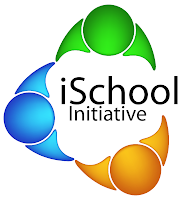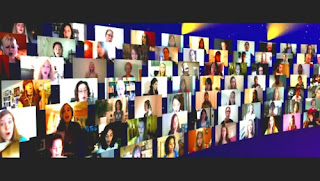Dr. McLeod is an associate Professor of Educational Leadership at the University of Kentucky. He is the founding Director of the UCEA Center for the Advanced Study of Technology Leadership in Education(CASTLE). Dr. Scott McLeod is widely recognized as one of the nations leading academic experts on K-12school technology leadership issues. He posted a post Don't Teach Your Kids This Stuff.Please? Below is my response.
Dear Dr. McLeod,
My name is Audrey Mitchell. I am enrolled in Dr.Strange’s EDM310 course at the University of South Alabama. I completely agree with you wanting to see who has the next leg up. Everything that people do in today’s world is risky.This can even just be going to the coffee shop. Though this does not mean that people should have zero involvement with the outside world. If students are properly taught by their educators then they should be able to use the internet and any kind of social network to help them better educate themselves. I loved your sarcasm in your post. It grabbed my attention and actually ticked me off a little while I was believing every word that you were saying. It all sounded off the wall ridiculous but all at the same time extremely true. I am a huge believer in using what we have available to best educate our students for the future.
The iSchool Initiative :17 year old high school student Travis Allen, created a program called iSchool. This program is based around the use of an iPod Touch in a classroom. In the video, Travis demonstrates what all a iPod Touch has to offer. Travis has basically built a school inside of the iPod. He demonstrates that there are apps for the following: email, chemical touch(periodic table), US Constitution, world wiki, scientific and graphic calculators, notes, calendar, access to text books and regular reading books, iHomework, USA Presidents, star walk, formulae ,and a recorder. At the end of the video Travis demonstrates how money can be saved through this program. He says that each student would save the minimum of $600 and the iSchool would cost $150 per student. I think that this is a creative idea but I am not fully convinced that it would work. Is this program aimed to be home school based or still classroom based? I am also scared that this will make student even less social then they already are. I am a huge believer in technology being positive in a classroom but I also believe that everything can be harmful if used to much.
Zeitgeist Young Mind's Entry (Travis Allen)
On February 21,2011 CNN said " With one post on You Tube , Georgia high school student Travis Allen launched a revolution". Larry Jacobs-President Education Talk Radio said " Travis Allen is the Mark Zuckerburg of Education". At age 17 Travis launched the You Tube video. At age 18 he created iSchool initiative. He now has a group of 25 students traveling the country inspiring schools to embrace global learning. Allen says we " Must rethink, retool, rebuild our educational institution to better prepare our youth for the digital world they were born into". I am very impressed by the outstanding progress that Travis Allen has made over the years. However, I still agree with the comments that I made above. I would love to see his plan make a difference but I am just not positive it will.
Eric Whitacre's Virtual Choir :
Eric's video was mind blowing. Yes a choir ensemble of 185 people is all that impressive, but a choir ensemble of 185 people who never met or sang together is. Eric put this performance together on the internet and posted in on You Tube. I think this process is an example of how far technology has come in the 21 century. This use of technology can give us access to pretty much anything. I find this scary but also very useful as long as people follow the rules and do it legally. I think this will be a fun activity for elementary school children. They will have to use brainstorming abilities that they have never had to before.
In this video Kevin Robert's shows that he believes that teaching in the 21 century mean that teachers are no longer the main source of learning. We as teachers today are the filters. The way to educate has changed dramatically over the years. In the 21 century we are privileged to have access to many forms of technology. Students and teachers today have access to: blogs, cellphones,twitter, facebook, wikipedia, youtube, iPods, and google. There are many ways to use these sources to help educate others as a teacher, or yourself as a student. Students can use these sources to validate information,synthesize information, leverage information, communicate information, collaborate with information, problem solve with information. As a teacher in learning I am very found of using technology in a classroom and I believe that Robert's view on teaching is accurate. I do wonder how teachers are able to keep students from getting off track and using these technologies in the wrong way. The video had a great point. All tools provide temptation but they are not a source of negative behavior.
Reading Rockets :
On Reading Rockets I found many things that I thought I may one day use in the classroom. One of my main challenges that I think I am going to face as a teacher is teaching my students how to read. ABCs of Teaching Reading says it perfectly. If teaching children was an easy task then it would come as easily as speaking does to children. Being able to read does not just come by exposing yourself to books, it must be taught. For many children this ability comes by being taught slowly and taking it one step at a time.
Frank McCourt in Reading for Meaning also has a great point behind the usefulness of reading and learning how to read. On night when at a bar McCourt was given directions which lead him to the public library. McCourt grabbed a few books and headed back to the bar. The most useful advise that the bartender gave McCourt and for myself was " You have the book in your hand young fellow but you don't have it in your head. So go home and read". Getting a book in your head, understanding it, and connecting it to everything in your life is the best way to learn how to read.
On February 21,2011 CNN said " With one post on You Tube , Georgia high school student Travis Allen launched a revolution". Larry Jacobs-President Education Talk Radio said " Travis Allen is the Mark Zuckerburg of Education". At age 17 Travis launched the You Tube video. At age 18 he created iSchool initiative. He now has a group of 25 students traveling the country inspiring schools to embrace global learning. Allen says we " Must rethink, retool, rebuild our educational institution to better prepare our youth for the digital world they were born into". I am very impressed by the outstanding progress that Travis Allen has made over the years. However, I still agree with the comments that I made above. I would love to see his plan make a difference but I am just not positive it will.
Eric Whitacre's Virtual Choir :
Eric's video was mind blowing. Yes a choir ensemble of 185 people is all that impressive, but a choir ensemble of 185 people who never met or sang together is. Eric put this performance together on the internet and posted in on You Tube. I think this process is an example of how far technology has come in the 21 century. This use of technology can give us access to pretty much anything. I find this scary but also very useful as long as people follow the rules and do it legally. I think this will be a fun activity for elementary school children. They will have to use brainstorming abilities that they have never had to before.
In this video Kevin Robert's shows that he believes that teaching in the 21 century mean that teachers are no longer the main source of learning. We as teachers today are the filters. The way to educate has changed dramatically over the years. In the 21 century we are privileged to have access to many forms of technology. Students and teachers today have access to: blogs, cellphones,twitter, facebook, wikipedia, youtube, iPods, and google. There are many ways to use these sources to help educate others as a teacher, or yourself as a student. Students can use these sources to validate information,synthesize information, leverage information, communicate information, collaborate with information, problem solve with information. As a teacher in learning I am very found of using technology in a classroom and I believe that Robert's view on teaching is accurate. I do wonder how teachers are able to keep students from getting off track and using these technologies in the wrong way. The video had a great point. All tools provide temptation but they are not a source of negative behavior.
Reading Rockets :
On Reading Rockets I found many things that I thought I may one day use in the classroom. One of my main challenges that I think I am going to face as a teacher is teaching my students how to read. ABCs of Teaching Reading says it perfectly. If teaching children was an easy task then it would come as easily as speaking does to children. Being able to read does not just come by exposing yourself to books, it must be taught. For many children this ability comes by being taught slowly and taking it one step at a time.
Frank McCourt in Reading for Meaning also has a great point behind the usefulness of reading and learning how to read. On night when at a bar McCourt was given directions which lead him to the public library. McCourt grabbed a few books and headed back to the bar. The most useful advise that the bartender gave McCourt and for myself was " You have the book in your hand young fellow but you don't have it in your head. So go home and read". Getting a book in your head, understanding it, and connecting it to everything in your life is the best way to learn how to read.






No comments:
Post a Comment